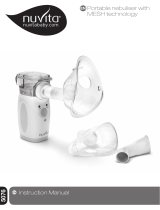
4 5
Do not operate the device at temperatures greater than 40˚C.
Do not tilt the nebuliser kit so the angle of the kit is greater than 45˚. Medication
may flow into the mouth.
Do not shake the nebuliser kit while using the device.
Do not subject the compressor, or any of the components to strong shocks, such
as dropping on the floor.
This device is approved for human use only.
Do not disassemble or attempt to repair the device or components.
Use the device only for its intended use as described in the instruction manual.
Do not use attachments not recommended by the manufacturer.
Dispose of the device, components and optional accessories according to
applicable local regulations. Unlawful disposal may cause environmental
pollution.
Make sure that the air tube is securely attached to the compressor (main unit)
and nebulising parts, and does not come loose. Twist the air tube slightly when
inserting it into the connectors to avoid the tube disconnecting during use.
CAUTION:
Do not use the compressor (main unit) and the power cord while they are wet.
Do not plug or unplug the power cord into the electrical outlet with wet hands.
Do not immerse the compressor (main unit) in water or other liquid.
Do not spill water or other liquids on the compressor .These parts are not
waterproof. If liquid spills on these parts, please unplug the power cord and wipe
off the liquid with gauze or other soft absorbent material immediately.
Do not use or store the device in humid locations or outdoors. Use the device
within the operating temperature and humidity.
Do not overload power outlets. Plug the device into the appropriate voltage
outlet.
Do not use extension cords. Plug the power cord directly into the electrical outlet.
Unplug the power cord from the electrical outlet after using the device. Never
leave this product unattended when plugged in.
Unplug the power cord from the electrical outlet before cleaning the device.
Completely read all of the instructions included the optional accessories before
using them.
Not to position the ME EQUIPMENT so that it is difficult to operate the disconnec-
tion device.
The power switch is used to isolate the device from the supply mains.
The direction of movement of the actuator of the supply mains switch is comply
with IEC 60447.
RISK OF ELECTRICAL SHOCK
MAINTENANCE AND STORAGE
Keep the device out of the reach of unsupervised infants and children. The device
may contain small parts that can be swallowed.
Do not leave the cleaning solution in the nebuliser parts. Rinse the nebuliser parts
with clean hot tap water after disinfecting.
Wash the nebuliser parts after each use. Dry the parts immediately after washing.
Do not store the air tube with moisture or medication remaining in the air tube.
This could result in infection as a result of bacteria.
Store the device and the components in a clean, safe location.
Do not carry or leave the nebuliser with medication in the medication tank.
Do not place or attempt to dry the device, components or any of the nebuliser
parts in a microwave oven.
Do not wrap the power cord around the compressor (main unit).
Do not use the device if the air tube is bent.
Do not block the air filter cover.
Do not alter the baffle, the nozzle in the medication tank or any part of the nebulis-
er kit.
Do not add more than 10ml of medication to the medication tank.














